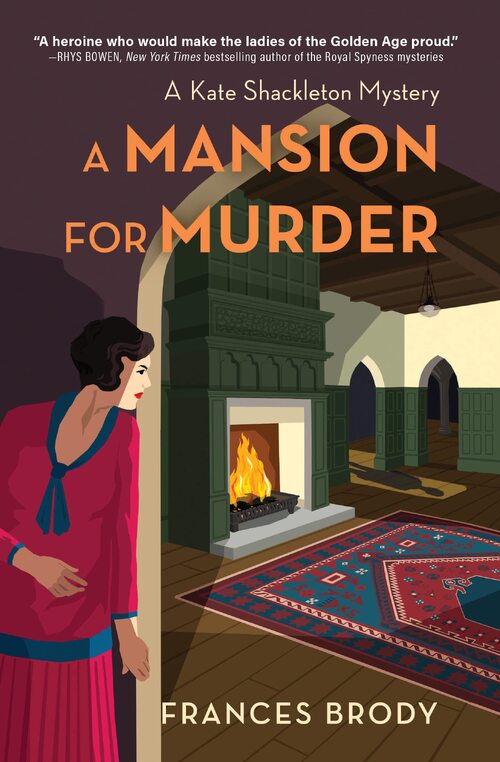 CRUEL SUMMER |
 Fall headfirst into July’s hottest stories—danger, desire, and happily-ever-afters await. |

Purchase
Kate Shackleton #13 Mystery Historical Excerpt of A Mansion for Murder by Frances BrodyA MANSION FOR MURDER by FRANCES BRODY Author’s note: My fictional story draws on real places and real tragedies. The village of Saltaire, West Yorkshire, is now a UNESCO World Heritage Site. Salts Mill still stands. What remains of Milner Field Mansion are the stories of a house with a reputation as unlucky, a risky place to set down roots. My novel begins with a prologue, Long Ago, from the point of view of a young boy called Nick who lived in a hut on the land where Titus Salt Junior’s Milner Field Mansion would be built. Nick witnessed the demolition of the Elizabethan manor house that made way for the new building. When, in 1930, Kate Shackleton receives a letter from a stranger, Nick still lives in the village, his sight diminished, his memories intact.
LONG AGO Long ago, Nick lived with his grandmother in a hut on the land called Milner Field. On Sundays, his grandmother washed his face at the well that belonged to the old manor house nearby. She put her shawl over her head and shoulders and her empty basket over her arm. They would walk along the towpath to Shipley, to the Chapel of Golden Light. They sat on chairs that hurt your bottom, listened to Bible stories, and sang hymns. When he could write his name, Nick joined the Band of Hope and signed the pledge. Never a drop of alcohol would pass his lips as long as he should live. On the day he signed the pledge, a Golden Light lady gave Nick a pair of clogs. After repeating words called declarations, they drank warm sweet tea, ate a slice of bread and butter sprinkled with sugar, and left with their basket half full of food and their souls saved. Walking back along the canal, cheerful, relieved to be out of it, the pair of them sang, ‘For the Love of Barbara Allen’, ‘Ten Green Bottles’ and ‘A-hunting We Will Go’. Nick had all the actions off pat, made up by himself. His grandmother copied him as best she could. One day, when he was squidging and squelching along the muddy path, carrying their bucket to fetch water from the manor house well, he stepped in a puddle. One of his clogs came off. He set down his bucket, giving him two free hands to rescue his clog, making a watching frog jump. You can have too much rain. At the well, he turned the handle, lowered the big bucket, and then slowly raised it. When he took water for his own bucket, he saw a bone that had come from the well to present itself to him. His grandmother had eyes in the back of her head. She found his bone. ‘This is no good for soup,’ said she. She was pretending, thinking that he did not know the bone once belonged to a live person. ***
CHAPTER ONE My name is Kate Shackleton. On that Saturday afternoon in August,1930, I boarded a train from Leeds to Saltaire, looking out at smoke-blackened factories and rows of red-brick houses. The landscape gave way to trees, mill chimneys and stone -built cottages. Nettles, nightshade, and buttercups brightened the railway embankment. Investigating as a profession crept up on me unawares, almost a decade ago, just as I was wondering what to do with the rest of my life. After the Great War there was so much upheaval. My husband was one of the many who did not return from the battlefields. Across the world, so many lives would never be the same again. During that aftermath of war, I discovered my knack for investigating. I engaged a housekeeper, Mrs Sugden, and recruited a former police officer assistant, Jim Sykes. In the summer of 1930, hard times and warm days swallowed requests for our services. Mrs Sugden planned to fill the quiet time by doing some decorating. The arrival of a letter on the last Monday of July broke a spell of inertia. The letter was neatly written in black ink by someone who practised his penmanship. There was just one tiny blot where the writer had pressed too hard on a comma. The envelope was formally addressed to Mrs Gerald Shackleton, so from someone who knew my husband’s name. Bank letters and business letters address me that way. My mother and aunt have now replaced Gerald with Catherine. For cousins and friends I am Mrs Kate Shackleton. Did the ‘Mrs Gerald Shackleton’ mean I had to brace myself for some old comrade’s story about Gerald? I sat at the kitchen table to read this letter from a stranger. South Lodge, Milner Field, Saltaire 26th July 1930
Dear Madam, Please excuse a stranger writing to you. I found out your address through a pal. I am twenty-two years old and live with my parents who take care of a mansion you may have heard of - Milner Field. The mansion is up for sale. The Lodge, where we live, is part of the sale so I may not live here much longer. My mother is housekeeper at Milner Field. My father is head gardener. The possibility of moving away made me write to you today. I work for Salts Mill in the maintenance department and am shortly to take on bigger responsibilities. I tell you this so you will know I am not someone out of the blue with a bee in his bonnet, but a man who is building his reputation and wants to do things right. Here is the matter in a nutshell. I have something to tell you, a story about the past that I know will be of interest to you. Please trust that I cannot say more at present. *** Excerpt from A Mansion for Murder by Frances Brody |
|
| |||
|
||||



 © 2003-2025
© 2003-2025